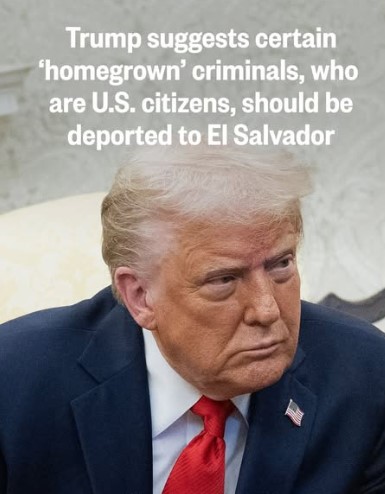A deeply troubling scenario emerged Monday as legal scholars and immigration advocates responded with alarm to recent remarks by former President Donald Trump, who floated the idea of deporting U.S. citizens convicted of certain crimes—without specifying what those crimes might be.
The comments came during a meeting at the White House with El Salvadoran President Nayib Bukele, where Trump praised recent bilateral cooperation on immigration enforcement. Bukele has previously agreed to accept deportees into a notoriously harsh prison system in El Salvador, including individuals the U.S. has alleged are gang-affiliated.
“We always have to obey the laws,” Trump said during the discussion, “but we also have homegrown criminals that push people into subways, that hit elderly ladies on the back of the head with a baseball bat when they’re not looking—these are absolute monsters. I’d like to include them.”
While Trump did not specify who “them” referred to, the implications were clear: he appeared to be proposing the deportation of individuals, potentially even U.S. citizens, on the basis of domestic criminal offenses.
The ambiguity around Trump’s comments has raised significant legal concerns, particularly regarding due process and constitutional protections guaranteed to citizens of the United States. Experts warn that the suggestion, if acted upon, could set a dangerous precedent.
“If They Can Deport an Immigrant, Why Not a Citizen?”
The core of the debate centers on the alarming possibility of eroding due process rights for individuals—first for non-citizens, and eventually, perhaps, for natural-born or naturalized citizens.
Historically, even non-citizens are entitled to basic legal protections, such as the right to a hearing before deportation. Yet recent immigration policies have seen expanded use of expedited removal procedures, which critics argue allow for deportation with minimal judicial oversight, particularly in cases involving alleged gang affiliations.
“If an immigrant can be deported to a foreign prison without even a hearing, the door is opened to apply that logic to anyone the government finds inconvenient,” said a constitutional law professor from a major U.S. university, who asked not to be named. “That includes citizens.”
Though rare, naturalized citizens can have their citizenship revoked if it was obtained through fraud or misrepresentation. However, the idea of stripping individuals of citizenship for criminal activity—and deporting them—steps into legally uncharted and constitutionally perilous territory.
The White House and the Department of Justice have yet to clarify whether Trump’s comments referred exclusively to naturalized citizens or if they suggest a broader policy shift. Messages seeking comment from both offices have not been returned.
Legal Boundaries and Historical Precedents
Deporting U.S. citizens, especially those born in the country, would directly violate constitutional protections under the 14th Amendment, which guarantees citizenship by birthright and safeguards due process.
Historically, even in periods of heightened fear—such as the internment of Japanese Americans during World War II or the McCarthy-era blacklists—citizenship was not a condition that could be revoked on the basis of criminal suspicion alone.
Legal experts caution that the U.S. government lacks the constitutional authority to deport its citizens, regardless of their criminal histories. Attempting to do so would almost certainly result in prolonged legal battles and, they argue, irreparable harm to foundational legal norms.
Broader Implications
Trump’s remarks also echo a broader trend of increasingly punitive immigration rhetoric. Critics fear that this type of language undermines the distinction between non-citizens and citizens, and reinforces the idea that citizenship itself can be conditional—subject to the whims of political leadership.
“This isn’t just about immigration,” said a civil liberties attorney. “It’s about whether any of us can be confident in the security of our rights, or whether the government can unilaterally decide who belongs and who doesn’t.”
As of now, the proposal remains speculative. But with mounting legal and ethical questions, observers say the need for public scrutiny and legal resistance has never been more urgent.
Source: Statements made by former President Donald Trump during a meeting with El Salvadoran President Nayib Bukele, as reported by multiple news outlets.

